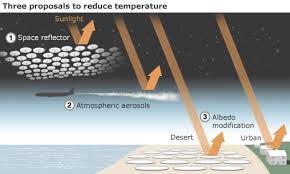Overview
Global warming refers to the rise in the average temperature of the climate system of the Earth. Some of the energy has resulted in the increase in ocean temperature. Some glaciers and icebergs have already melted, resulting in widespread change in habitat for many Arctic species. Scientists and politicians have proposed ways to combat global warming by reducing greenhouse gases, adapting to climate change, and engineering the environment. However, not all scientists and politicians agree with its impact or solutions to the problem.
Reducing Greenhouse Gases
Some of the solutions to combat global warming involve reducing greenhouse gases such as carbon dioxide, methane, and nitrous oxide. All of those compounds occur naturally in the atmosphere, but their increase is a result of human activities that create widespread pollution.
Changing Energy Sources
Primary use of fossil fuels such as coal and oil has increased pollution, as well as depleting natural resources that are not renewable. Many pollutants are released into the atmosphere, such as those that make up smog. Since 2005, scientists and politicians throughout the world have discussed changing energy sources to those that are renewable and reduce carbon emissions. Wind power and solar power use renewable energy sources to generate electricity. Hydroelectric power is low cost, and many of the effects of building dams and flooding land can also be mitigated. Although nuclear power uses a nonrenewable energy source, new types of reactors are in development that use radioactive elements other than uranium.
Reducing Carbon Emissions
Many ideas to increase efficiency of the energies already in use are under development. Some of the techniques that reduce carbon emissions from conventional power plants involve carbon capture and storage. Some of the carbon dioxide is diverted, rather than released into the atmosphere. Although some chemical processes are already in use, many are in future development stages, as technology is developed. Another way to reduce the effects of CO2in the atmosphere is by increasing the amount of forests that are replanted, as plants, especially trees, convert carbon dioxide to oxygen.
Nuclear Power
Nuclear power plants are used to produce electricity worldwide in many different countries. Although accidents, such as Chernobyl, Three Mile Island, and the Fukushima disaster following the tsunami in Japan, raise many concerns about its safety, nuclear power remains a large-scale alternative power source that produces large quantities of electrical and other types of energy. Japan, along with a few other countries, has a moratorium on new nuclear plants during the time that technologies are developed to prevent future disasters. While most nuclear reactors currently in use were developed using uranium as fuel, a few now use thorium, an element that is three times as common as uranium. Radioactive waste from thorium has a shorter half-life than waste from uranium and plutonium. Also, some reactors are in development to use radioactive waste as fuel.
Adapting to Climate Change
Some scientists propose ways to adapt to changing climate conditions. These adaptations go hand-in-hand with strategies to reduce greenhouse gases. If greenhouse gases are not reduced, the effects of global warming will exceed the capacity of organisms to adapt. Some of their strategies include development of new food sources that are more resilient, planting of heat-tolerant trees in urban areas, and more efficient storage of rainwater from storms.
Engineering the Environment
Some of the ways proposed to engineer the environment include climate control, including ways to control extreme weather; creating a shield in space to block some of the solar radiation; and tethering icebergs to keep them from drifting into warmer waters and melting. Other proposals include methods of making surfaces and clouds lighter so they will reflect more sunlight; rather than trapping it in the atmosphere; and directly removing excess carbon dioxide from the atmosphere.
Interested in science tutoring services? Learn more about how we are assisting thousands of students each academic year.
SchoolTutoring Academy is the premier educational services company for K-12 and college students. We offer tutoring programs for students in K-12, AP classes, and college. To learn more about how we help parents and students in Mountain Home, ID: visit Tutoring in Mountain Home, ID




